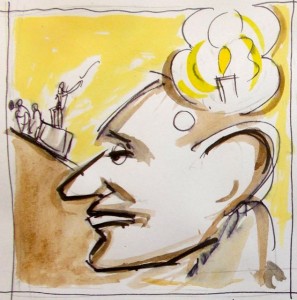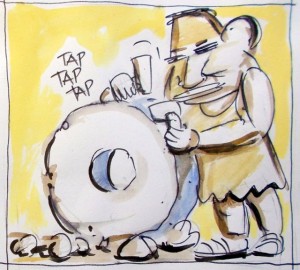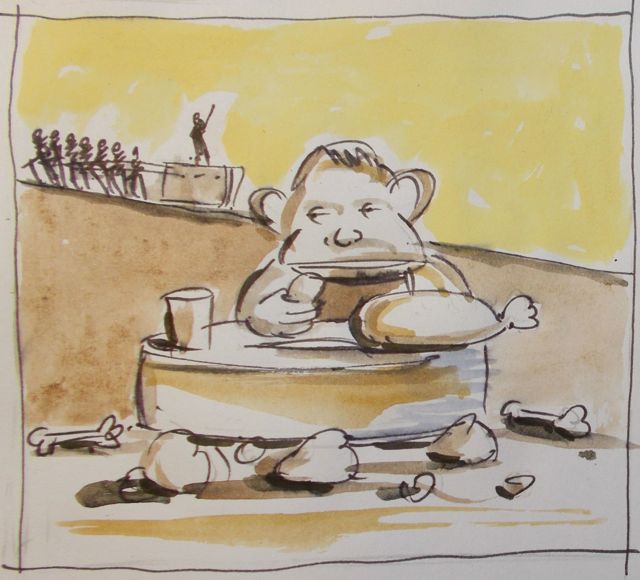Man as Machine XI
by TARQUIN O’FLAHERTY
 The idea of democracy had been around for a long time but thinkers had virtually despaired of making it work. Government by every single person in the country? How on earth can that work? There seemed no sensible answer to this until Thomas Paine came along. Paine, an Englishman in America, produced a hugely popular periodical entitled ‘The Crisis’ in which he outlined his ideas on how democracy might operate. Simply put, Paine suggested that all people are born equal, with natural rights, derived from God. The first business of government should be the conversion of these ‘natural’ rights into civil rights so that every law, every statute, every principle might only be drawn up having first ensured the law did not impinge, in any way, on our ‘natural’, and now ‘civil’ rights. This was glorious, heady stuff and the New World rebels took to Paine’s ideas like ducks to water.
The idea of democracy had been around for a long time but thinkers had virtually despaired of making it work. Government by every single person in the country? How on earth can that work? There seemed no sensible answer to this until Thomas Paine came along. Paine, an Englishman in America, produced a hugely popular periodical entitled ‘The Crisis’ in which he outlined his ideas on how democracy might operate. Simply put, Paine suggested that all people are born equal, with natural rights, derived from God. The first business of government should be the conversion of these ‘natural’ rights into civil rights so that every law, every statute, every principle might only be drawn up having first ensured the law did not impinge, in any way, on our ‘natural’, and now ‘civil’ rights. This was glorious, heady stuff and the New World rebels took to Paine’s ideas like ducks to water.
Paine solved the seemingly chaotic problem of ‘government by everybody’ by suggesting that people of like mind in the new democracy would simply choose one of their number to represent their viewpoint in the Parliament.This would truly be government by ‘all of the people’, but through representation. Writ large across the whole country the major points of view, needs, worries etc. would all have a representative voice in Parliament. This was blissful stuff. Paine’s ideas were taken up virtually wholesale so that he eventually became so well regarded that in time he was offered the post of Foreign Affairs in the new Congress.
 In 1787 Thomas Paine arrived back in England. Paine had lost his post as American Foreign Secretary through hot-headedness and the almost inevitable ‘indiscretions’. Nevertheless his reputation had preceded him and he was welcomed with open arms by both England and France. For years, as we know, through Wilkes and others, there had been huge agitation in England for the reform of Parliament. Paine’s presence seemed just the ticket to advance the cause. Barely two years after Paine’s arrival, the King of France, Louis XVI was made to sign the French ‘Declaration of the Rights of Man’. Unfortunately this was not enough to stop the storming of the Bastille, Madame la Guillotine and the Terror.
In 1787 Thomas Paine arrived back in England. Paine had lost his post as American Foreign Secretary through hot-headedness and the almost inevitable ‘indiscretions’. Nevertheless his reputation had preceded him and he was welcomed with open arms by both England and France. For years, as we know, through Wilkes and others, there had been huge agitation in England for the reform of Parliament. Paine’s presence seemed just the ticket to advance the cause. Barely two years after Paine’s arrival, the King of France, Louis XVI was made to sign the French ‘Declaration of the Rights of Man’. Unfortunately this was not enough to stop the storming of the Bastille, Madame la Guillotine and the Terror.
The over enthusiastic use of the guillotine horrified the statesman Edmund Burke who wrote ‘Reflections on the Revolution in France’ (1790) a no holds barred attack on what he considered to be French savagery. In the same year Paine produced a defence of the French action, a pamphlet entitled ‘Rights of Man’ in which he famously said of Burke that ‘he pitied the plumage, and not the dying bird’.
Part of Paine’s ‘Rights of Man’ proposals included the abolition of sinecures (jobs for the boys), to levy duties on estates, to abolish the Poor Law, to bring in pensions, maternity allowances, educational systems, allowances for children, in fact most of the services and facilities we nowadays take for granted.
The French loved Paine and elected him to their version of Congress (The Convention). Societies were set up all over England to propagate his ideas. Paine produced his ‘Rights of Man’ in book form and sold at least 200,000 copies.
The English aristocracy, initially enthusiastic, began to waver, especially as they saw their Gallic counterparts having their heads chopped off. Deciding their own heads were safe, providing they were deep enough in the sand, they issued a special proclamation against seditious publications. A prosecution was immediately begun against Paine, and an order for his arrest was issued. Paine didn’t take the order seriously, but William Blake the poet did. Virtually seizing Paine by the scruff of the neck he frog marched him down to Dover and forced him onto a ship. Paine escaped arrest for sedition by a whisker. Sedition could easily carry the death penalty, especially in time of war and Britain had been at war with France since 1793. Obviously Blake considered Paine’s life too precious to lose.

TO BE CONTINUED
